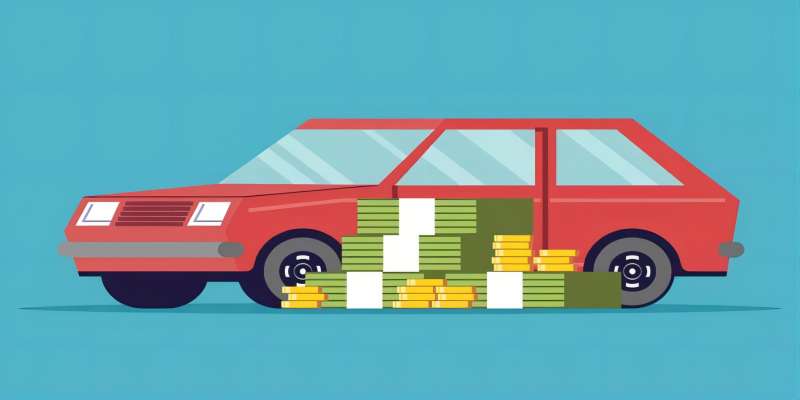Secured Car Loans | A Detailed Analysis
Feb 08, 2024 By Triston Martin
If you’ve caught your eye on a newfangled car and require additional money to reach behind the wheel, you’ve possibly begun looking for a car loan. And that suggests you must go for ‘Secured car loans.’
This assists in keeping rates competitive and declines the lender’s danger, which can support people with insufficient credit or a negative credit record.
As the vehicle guaranteed the loan, you could have it recaptured if you cannot refund it. But, a secured car loan is generally the most suitable option for most creditors. Besides better competitive rates, financiers may propose a duration of up to 96 months and a comparatively fast application procedure. So, while there are advantages to an unguaranteed loan, you might have a better chance of discovering and passing for a secured car loan.
How Secured Car Loans Work?

The first question that will come to your mind is: How does a secured loan work? Like any debt, you will be accountable for refunding the amount you take up, plus interest and fee expenditures. When you take up a secured car loan, you use the car you purchase as a guarantee. This implies the lender will hold the auto title until you repay your debt.
If you are unable to repay, the lender can reclaim your car and sell it to recover the loss. For this reason, financiers can offer higher rates and function better with people with poor credit.
Requirements
If a lender asks for a guarantee, you should possess the assets. However, in many cases, the security for a secured auto loan is the car itself.
- Earnings: For each car loan, checkable income is compulsory. This can be in the shape of paycheck bills from your last numerous pay terms, documents of your federal taxation returns if you are a freelancer, or bank statements that offer regular monthly pledges from other origins of income.
- Employment: You must be able to reveal a stable root of income. For many people, this assumes the type of employment. Overall, lenders favor applicants who indicate that they have had regular employment for at least one year. However, for free agents or individuals with other income bases (spousal assistance, property, etc.), the best lenders will function with you as long as you can prove that your revenue is stable and steady.
- Home: In many circumstances, lenders must prove you have constant residency and have been in your house for at least one year. Nevertheless, if you have just moved into your current home, you should be capable of showing that you have been in one house for at least one year in the past few years.
Best Car Loan Companies and Rates

After learning about the requirements, you definitely want to learn about the secured auto loan rates. Here is a summary of the rates of some companies.
PenFed Auto Loan
Loan term: 36, 48, 60, 72, or 84 months
Loan amount: Up to $150,000
Bank of America Auto Loan
Loan term: 48, 60, or 72 months
Loan amount: No maximum
LightStream Auto Loan
Loan term: 24 to 144 months
Loan amount: $5,000 to $100,000
Consumers Credit Union Auto Loan
Loan term: Up to 96 months
Loan amount: $1,000 to $100,000
PNC Auto Loan
Loan term: 12 to 72 months
Loan amount: $7,500 to $75,000+
Capital One Auto Finance
Loan term: 36 to 72 months
Loan amount: Below $100,000
Alliant Auto Loan
Loan term: 12 to 84 months
Loan amount: $4,000 to $1,000,000
Are Secured Loans Better?
Here, two questions arise: Are secured loans better? & Should we choose secured car loans? The answer is yes. The secured loans where the car itself serves as a guarantee typically run between 3.2 and 5.2 percent, and they have been thrust out to a maximum of 6 on average and, in some situations, as far as 80+ months.
Secured auto loans are more suitable for auto purchases than unsecured ones. With interest percentages at nearly 12.5 percent and a 48-month time on the loan, you will discover that purchasing a confidential car with a far higher monthly payment than the standard car loan will leave you with a far greater monthly payment.
Pros and Cons of Secured Car Loans

To consider secured car loans, you must consider their positive and negative aspects. This will help you to assess your decision.
Pros
- Decreased Interest Rates: The interest rate applicants pay on a credit generally signifies how much risk the borrower is carrying taking up money. The interest percentage often declines when you reserve a loan with a possession.
- Takeup More: As you reserve your loan, you can borrow a higher ratio of the car’s value than you might be capable of alternatively. Sometimes, you might take up 100% of the car’s money and related costs. That implies you won’t be required to spend money to purchase a car, which can be a giant plus for many individuals.
- Flexibility: Most importantly, secured car loans can be settled anytime. That signifies it will be effortless if you like to pay off your loan after earning a bonus from your job. Not every car loan is adjustable, and studying all the loan conditions is essential before taking out any money.
Cons
- Lender Can Reclaim Your Car: If you fail to pay the loan, the lender can claim your car. The point that the automobile guarantees the loan saves the lender from non-payment.
- Simpler to Overspend: Almost all lenders propose some type of car finance, and when you can purchase a vehicle or auto with a secured car loan with no money as a down payment, it is effortless to overspend.
Conclusion
You now understand the potential benefits and constraints of secured car loans. You can prefer a low-interest secured car loan if you can address the loan effectively. You can select the term and value of your vehicle loan, calculating your income, compensation capability, other monthly expenditures, and general financial situation.







